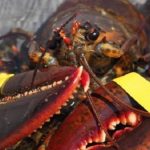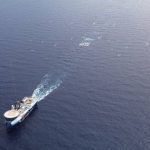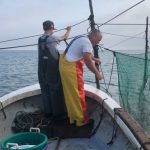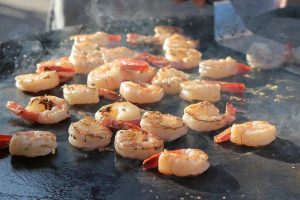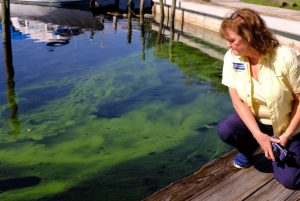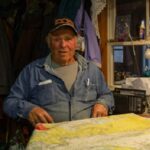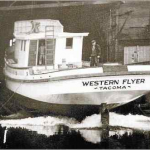Daily Archives: March 2, 2025
The last ‘I love you.’ Three months in, a mother struggles to overcome incredible loss
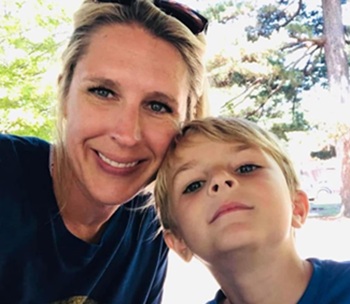
Meg Slezak takes a selfie with her 7-year-old son, Hunter. The boy and his father, Michael Slezak, died in a shrimp boat accident in November 2024.
Her voice sounded soft and shaky. She took deep breaths. She cried. She even chuckled a few times when she thought back to the joy her husband and son brought her. Three months after she lost them, Meg Slezak of Wilmer, Alabama, wants to tell her story. The sun had yet to rise on November 29, 2024. It was the day after Thanksgiving- the day the Slezaks gathered to give thanks for their wonderful lives, dressed in orange and posed for a family picture. While Meg was getting ready for work, Hunter was bouncing off the walls. He was about to go on his first shrimping adventure. Dad Michael made sure food, water and life preservers were in tow. “Michael liked to spend some alone time with each of our children,” Meg told me. “That day was Hunter’s Day.” They were about to step out the door, on their way to Pelican Bay at Dauphin Island, Alabama. They would be headed toward the boat owned by 69-year-old Sam “Ollie” Wooley, a longtime shrimp boat captain who was a Vietnam Navy veteran. “Both Michael and Hunter gave me a hug,” said Meg. “For some reason, Hunter turned around when he got to the door. He walked back to me and gave me another hug,” added Meg. Hunter said, “I love you.” Meg said, “I love you, too.” Photos, more, >>CLICK TO READ<< 15:21
Icewater Seafoods processes northern cod for the first time in 32 years
 For over three decades, Icewater Seafood’s Arnolds Cove fish plant has kept itself going processing fish from other countries. But on Feb 24, 2025, the plant processed its first N.L. offshore cod since the moratorium in 1992. Plant workers were thrilled this week to be processing local cod. Not only did it mean they get to work with fresher and higher quality fish, but it means more money will be coming their way. Janet Hynes has been at the plant for 38 years and remembers the day operations shut down due to the moratorium. “We were devastated,” said Hynes. “We didn’t really know what was going to happen at that time.” Over the past 32 years, quality control coordinator Brenda Hickey, said she never gave up hope. “I was thinking this is going to come back … and it did. We’re super excited,” she said. more, >>CLICK TO READ<< 09:41
For over three decades, Icewater Seafood’s Arnolds Cove fish plant has kept itself going processing fish from other countries. But on Feb 24, 2025, the plant processed its first N.L. offshore cod since the moratorium in 1992. Plant workers were thrilled this week to be processing local cod. Not only did it mean they get to work with fresher and higher quality fish, but it means more money will be coming their way. Janet Hynes has been at the plant for 38 years and remembers the day operations shut down due to the moratorium. “We were devastated,” said Hynes. “We didn’t really know what was going to happen at that time.” Over the past 32 years, quality control coordinator Brenda Hickey, said she never gave up hope. “I was thinking this is going to come back … and it did. We’re super excited,” she said. more, >>CLICK TO READ<< 09:41
‘Alarm bells.’ After low oxygen scare in Cape waters, Falmouth company uses $2M to help
 In a small room in the Falmouth Technology Park, Noah Van Home is assembling 450 sensors that will be scattered in waters from Maine to New Jersey to help scientists, fishermen and businesses in the blue economy learn more about the ocean. Lowell Instruments of Falmouth has been hired to manufacture the data loggers that will collect bottom water temperature and dissolved oxygen readings. The program gives fishermen and scientists a look at what’s happening in the water, not just on top of it. Longtime lobsterman David Casoni agrees. He’s been fishing for 50 years, the last four of them with data loggers tied to his lobster traps. He started using them after an episode in September 2019 when lobstermen in Cape Cod Bay started pulling up traps with dead lobsters inside. No one knew what had happened, he said. more, >>CLICK TO READ<< 08:28
In a small room in the Falmouth Technology Park, Noah Van Home is assembling 450 sensors that will be scattered in waters from Maine to New Jersey to help scientists, fishermen and businesses in the blue economy learn more about the ocean. Lowell Instruments of Falmouth has been hired to manufacture the data loggers that will collect bottom water temperature and dissolved oxygen readings. The program gives fishermen and scientists a look at what’s happening in the water, not just on top of it. Longtime lobsterman David Casoni agrees. He’s been fishing for 50 years, the last four of them with data loggers tied to his lobster traps. He started using them after an episode in September 2019 when lobstermen in Cape Cod Bay started pulling up traps with dead lobsters inside. No one knew what had happened, he said. more, >>CLICK TO READ<< 08:28
Three NJ herring fishermen made history at the Supreme Court, but their fight isn’t over
 Three herring fishermen from Cape May fought the law all the way to the U.S. Supreme Court and won. In doing so, the three men overturned the 40-year-old U.S. Supreme Court, thus making it easier for them and others to challenge federal regulations in court. But their battle is not over. The fishermen are challenging what they say is an unlawful requirement that forces them to surrender 20% of their earnings to pay at-sea monitors, who gather information that is used to regulate their industry. That worked out to as much as $700 a day, which is more pay than the crews take home sometimes. The requirement was imposed on them by an executive branch agency — in this case the U.S. Dept. of Commerce, which oversees the National Oceanic and Atmospheric Administration, which in turn regulates the nation’s fisheries. The at-sea monitors were never approved by Congress, but due to the so-called Chevron deference, the fishermen were handicapped to fight the rule, because the courts always deferred to the regulatory agencies. more, >>CLICK TO READ<< 06:50
Three herring fishermen from Cape May fought the law all the way to the U.S. Supreme Court and won. In doing so, the three men overturned the 40-year-old U.S. Supreme Court, thus making it easier for them and others to challenge federal regulations in court. But their battle is not over. The fishermen are challenging what they say is an unlawful requirement that forces them to surrender 20% of their earnings to pay at-sea monitors, who gather information that is used to regulate their industry. That worked out to as much as $700 a day, which is more pay than the crews take home sometimes. The requirement was imposed on them by an executive branch agency — in this case the U.S. Dept. of Commerce, which oversees the National Oceanic and Atmospheric Administration, which in turn regulates the nation’s fisheries. The at-sea monitors were never approved by Congress, but due to the so-called Chevron deference, the fishermen were handicapped to fight the rule, because the courts always deferred to the regulatory agencies. more, >>CLICK TO READ<< 06:50

































